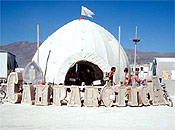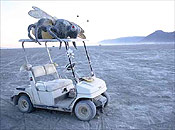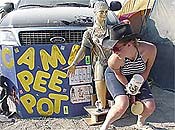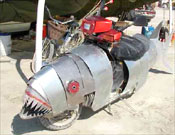Business Services manages various on-playa functions that involve contact with outside vendors to support the Burning Man community: the center camp Café, ice sales/CampArctica, and the staff commissary. Similarly, we support other Burning Man departments by negotiating and managing vendor contracts for services including office buildings, golf carts, medical shelters and cots, porta-potties and the Gerlach shuttle.
 Because of the remoteness of the event and the harsh conditions of our environment, it is often difficult to identify vendors who are willing to work with us at all, putting their equipment and sometimes their employees on the playa in the middle of our inspired lunacy and challenging weather. We send out RFP’s (requests for proposals/price quotes) to appropriate potential vendors for all large contracts well in advance of the event. It is quite typical to receive no more than one or two responses from a pool of 15 possible service providers, even with assiduous telephone follow-up and lots of coddling.
Because of the remoteness of the event and the harsh conditions of our environment, it is often difficult to identify vendors who are willing to work with us at all, putting their equipment and sometimes their employees on the playa in the middle of our inspired lunacy and challenging weather. We send out RFP’s (requests for proposals/price quotes) to appropriate potential vendors for all large contracts well in advance of the event. It is quite typical to receive no more than one or two responses from a pool of 15 possible service providers, even with assiduous telephone follow-up and lots of coddling.
Buildings are a case in point. In 2001, we needed 20 temporary office building-type structures to run the city. (Think of the 8-window Box Office as you entered the city, the building used by REMSA as their on-playa “hospital”, the Burning Man Information Radio (BMIR) broadcast center, the building used by the Rangers for radio dispatch and so forth). We own one such building and the DPW built three additional buildings (for medical north and south and the bus depot). For the remaining 16 we were at the mercy of the temporary office building industry, which rents buildings for a minimum of one month (or even three months) and charges hefty transportation fees to deliver them by specially-outfitted semi trucks to the Black Rock Desert. In addition, because even temporary buildings must meet state safety inspection criteria, we must also pay for installation, tie-down, stair rentals, insurance, cleaning fees, etc. etc. etc. The end result is that securing a building for use that is adequately sealed and air-conditioned to allow us reliably to run computers, radios or other electronic equipment in a “dust-free” (!) environment can have a gross cost of upwards of $3,000 PER BUILDING. (Even at that price we consider ourselves lucky to be able to get what we need.) Each year we work through the rent vs. buy vs. build decision for buildings. We’ll be doing the same exercise again in 2002.

Golf carts are also a difficult situation. You likely saw various staff members driving golf carts before and during the event assisting Theme Camps with placement, providing quick response to medical calls, delivering coolers of water to work crews, etc. Golf carts are not typically built to run on a cracked-mud playa. We have been very grateful for our close relationship with Sierra Golf Cart and their willingness to work with us, to the extent possible, to retrofit golf carts to survive the desert conditions. A flatbed trailer, however, fits a maximum of only 10 golf carts and we are charged per-mile round trip for pickup and delivery. Consequently, a cart that would cost you $35 per day to rent in the city costs dramatically more in the Black Rock Desert when you factor in the $720 per-load delivery fee. Here again, the “rent vs. buy” decision is affected by our limited ability to store carts through the winter under protected conditions, and by our constant search to identify the perfect “playa transport vehicle(s)”.
The Gerlach shuttle service provides a different type of challenge. Because we operate on public roads, our shuttle carrier must have the appropriate commercial license and insurance to run this sort of service in Nevada. The local “casino bus”-type operators, however, would be a very uncomfortable cultural fit for our event. We have been thrilled with our partnership with The Green Tortoise, which has been able to save us the cost of transporting the shuttle buses to the playa by using those same buses to transport non-car-driving citizens to our event. To accommodate those riders who would otherwise have access to the buses for storage, relaxation, sleeping, etc. during the day, we provide the Tortoise camp with a container for storage of their passengers’ goods and a shade structure for lounging. Gardner Kent, the founder of the Tortoise, is a kindred spirit and a particular fan of Burning Man (it’s a mutual admiration society). As any of you who have ridden the Shuttle will attest, the Tortoise drivers are perfectly culturally suited to the task of transporting our motley community back and forth between our playa home and the pay phones and cash registers of Gerlach and Empire.
 Finally: POTTIES. As our community is well aware, we ended the 2000 event with a particular challenge. Based on the amount of trash thrown into the potties that year, we were no longer welcome to dump our waste in the Reno disposal facility. In addition we were put on notice by our vendor that the trash situation (and several other factors) made it impossible for him to service the large number of porta-pottie units we required to a reasonable standard of cleanliness. (That year more than 50% of his employees quit on site after spending all day and night pulling refuse-covered trash out of potties and hoses by hand — with only playa camping facilities for cleaning up and sleeping). The Burning Man organization made solving the pottie problem a very high priority for 2001, with two main foci: (1) Pottie placement and servicing logistics and (2) No Moop in the Poop.
Finally: POTTIES. As our community is well aware, we ended the 2000 event with a particular challenge. Based on the amount of trash thrown into the potties that year, we were no longer welcome to dump our waste in the Reno disposal facility. In addition we were put on notice by our vendor that the trash situation (and several other factors) made it impossible for him to service the large number of porta-pottie units we required to a reasonable standard of cleanliness. (That year more than 50% of his employees quit on site after spending all day and night pulling refuse-covered trash out of potties and hoses by hand — with only playa camping facilities for cleaning up and sleeping). The Burning Man organization made solving the pottie problem a very high priority for 2001, with two main foci: (1) Pottie placement and servicing logistics and (2) No Moop in the Poop.
To improve servicing logistics, we fixed a number of problems from previous years. First we doubled the number of potties in each bank and set them up so that a truck could pull off the road to the middle of a bank. This enabled the workers to shut down and service half of that bank’s toilets, then re-open the clean half and service the remaining half, without forcing the line of people waiting to go elsewhere. This doubled the cleaning team’s efficiency and solved the line and overuse problems prevalent in previous years when an entire bank was shut down during servicing, causing folks from that area to overload the neighboring bank.
In 2000 the 5 mph speed limit and scattered toilet placement made the servicing truck routes slow and inefficient. We solved this by placing all pottie banks on one circular route, so that the trucks could move easily from bank to bank with a minimum of wasted navigation time. The vendor also added more large tanker trucks to improve the efficiency of waste transport from BRC to Reno, where the waste facility agreed to accept our waste on probation: one more problem and were would be OUT. Splitting off RV servicing to a separate vendor ensured that we would not again be in the position of having to trade off these important services against one another. In March, Business Services turned over to DPW the critical responsibility for nailing down the details and making sure everything really happened as planned.
 To address the trash issue, we established a community-wide PR and education campaign. Before the December 2000 Town Meeting, we created the initial slogan “If it wasn’t in your body, don’t put it in the pottie” to begin to get out the word. In addition to the pottie presentation at the Town Meeting, we placed an early article in the JackRabbit Speaks to inform the community about the problem, and invited interested citizens to join our pottie discussion list on the topic. This list provided an active forum for suggestion of possible solutions and educational avenues. The list generated hundreds of signs placed at each toilet bank, public service announcements for the radio stations, a “Pooping Man” logo (seen on t-shirts, dust kerchiefs, etc.), lots of activity on many other community email lists and discussion groups, and more bad puns than you could possibly imagine. The Black Rock Gazette team jumped in with an article in the Gate edition, the Greeters added a crash course on pottie etiquette to their welcoming spiel, and the signs on Gate Road reminded incoming citizens of what (not) to do. The final result renewed our faith in our community: when people are educated about what is needed, we ARE capable of adjusting our behavior to make our city run smoothly (and our potties stay clean).
To address the trash issue, we established a community-wide PR and education campaign. Before the December 2000 Town Meeting, we created the initial slogan “If it wasn’t in your body, don’t put it in the pottie” to begin to get out the word. In addition to the pottie presentation at the Town Meeting, we placed an early article in the JackRabbit Speaks to inform the community about the problem, and invited interested citizens to join our pottie discussion list on the topic. This list provided an active forum for suggestion of possible solutions and educational avenues. The list generated hundreds of signs placed at each toilet bank, public service announcements for the radio stations, a “Pooping Man” logo (seen on t-shirts, dust kerchiefs, etc.), lots of activity on many other community email lists and discussion groups, and more bad puns than you could possibly imagine. The Black Rock Gazette team jumped in with an article in the Gate edition, the Greeters added a crash course on pottie etiquette to their welcoming spiel, and the signs on Gate Road reminded incoming citizens of what (not) to do. The final result renewed our faith in our community: when people are educated about what is needed, we ARE capable of adjusting our behavior to make our city run smoothly (and our potties stay clean).

